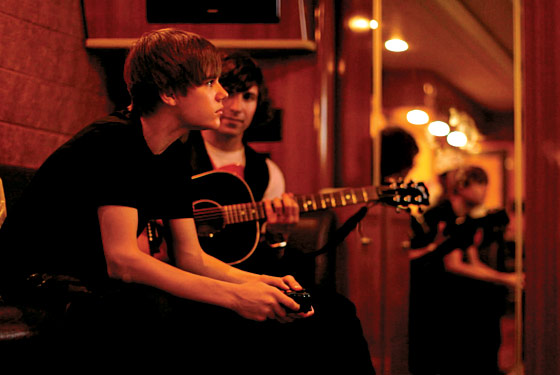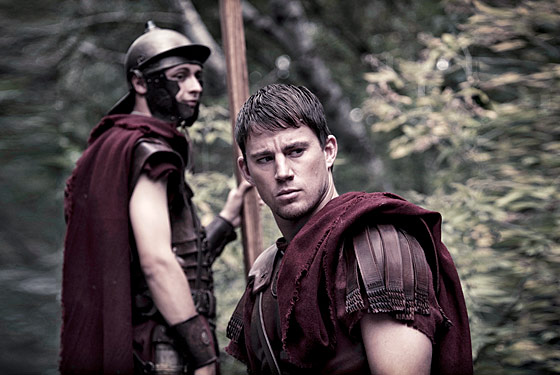
On our way to the concert documentary Justin Bieber: Never Say Never, my 12-year-old daughter asked, “Dad, do you think they’d mind if during the movie I screamed?” I said I thought the studio would be thrilled if she added her scream to the sum of all screams: She would thereby prove herself a “True Belieber.” The film, as it turns out, is packed with little girls screaming—and moaning and weeping and looking as if they’re ten seconds away from setting themselves on fire. I’d have screamed myself if I were a student of marketing. It’s a really hot piece of packaging.
The key, of course, is that Bieber is presented as a kid who rose to stardom without the aid of corporate packaging. Never Say Never opens with a computer screen and a mouse clicking on early YouTube viral videos: laughing babies, cute dogs, etc. Then there’s this little Canadian hair-helmet in a paneled room, a small-town boy with a big-city voice. “Hey, check out this kid!” reads a fake but representative e-mail. Bieber, we’re told, is the first social-network superstar.
He might well be, but the packagers have certainly arrived. The movie is cunningly woven to show the tension between his insane, abnormal success and his vow to remain a sane, normal 16-year-old. In this, we’re told, his background is crucial. His very young parents split when he was 10 months old, but he always had the love of his mother and her mom and dad, not to mention God and Jesus. No Disney incubator belched him forth. His manager, Scott “Scooter” Braun, first saw him on YouTube but couldn’t interest record companies without the Disney or Nickelodeon imprimatur. So Braun enlisted Usher, whom Bieber idolized, and Usher brought in producer Antonio “L.A.” Reid. But in the end, Bieber sold himself, on the road, in big and little markets, strumming and crooning for D.J.’s, until little girls began to mass outside radio stations like zombies in a George Romero movie.
Director Jon M. Chu jumps back and forth between the account of Bieber’s rise (with adorable home movies) and the countdown to his sold-out August 2010 concert at the “pinnacle,” Madison Square Garden: “Ten Days to Madison Square Garden … Nine Days to Madison Square Garden …” Since Bieber is already playing to sold-out arenas, there’s little in the way of suspense—until he starts to lose his voice and has to cancel a show in Syracuse. A doctor arrives. Justin’s tonsils, in close-up, look bad. “There’s gonna be a lot of kids let down,” says Bieber. But you gotta beliebe.
I saw Bieber perform over a year ago at a kiddie lollapalooza concert on Long Island, and he was in a different league from the other entities. He has a voice that needs no help from sound mixers and an easy, effortless-seeming slickness. The songs are about love, and if that sounds generic, so do they. That said, having risen out of the social network, he has more communication tools at his disposal than, say, Donny Osmond in his day. In the middle of “Baby,” he raps: “Yeah, I’m 16 and I thought that you’d be mine / I used to tweet you and text you and call you and hit you on Facebook all the time … Can’t believe that you did me wrong / We were on iChat all night long.”
The point is that Bieber is but a click away. “One day I tweeted him 100 times,” brags one girl. Another gushes, “I think about him, like, 99 percent of my life.” And with all that social media, she can.
In concert, one girl is always pulled from her seat to sit on a stool onstage during the number “One Less Lonely Girl.” As the blonde lass weeps and weeps while Bieber descends, messianically, to give her life (and a bouquet), I checked out my daughter and her friend—both rapt, both crying. I find him such a bland, pious, profoundly unthreatening little Furby of a pop idol, but little girls’ celebrity crushes are not to be trifled with. And this sensationally engineered promo film makes Justin Bieber look like a true force of nature.
The first of the late Rosemary Sutcliff’s stirring YA novels about the ancient Roman occupation of Britain, The Eagle of the Ninth, came out in 1954, a couple of years before the Suez Crisis, and is relatively unencumbered by pesky imperialist guilt. True, the Romans are said to have stolen lands and slaughtered a lot of natives. There’s that. But on the whole, Sutcliff finds them a civilizing force; and when the last of them flee (in the third novel of the series) after 400 years, it’s a tragedy for all concerned. The Eagle, the unfashionably exciting adaptation directed by Kevin Macdonald from a script by Jeremy Brock, doesn’t lay on any anachronistic anti-imperialist sentiments, either—the Romans are not Americans, the Brits are not Iraqis or Afghans. Here, conquest is a fact: Deal with it. More important, deal with it manfully.

The manliness is all. The drama centers on what we’d call the grunts on the ground, the ones forced to make moral decisions in the absence of clear rights and wrongs. The young, muscular Roman general Marcus Aquila (Channing Tatum) seems like a decent fellow, and so is the wiry Brit slave, Esca (Jamie Bell), whose life he helps to save in the gladiator arena. (He puts his thumb up and starts a trend.) They do have an uneasy relationship, the Romans having killed Esca’s father and the Brits (or at least a tribe of Britain) having presumably killed Marcus’s father, Flavius. Twenty years earlier, Rome’s 5,000-strong Ninth Legion led by Flavius Aquila disappeared north of Hadrian’s Wall in Caledonia (today’s Scotland) along with the golden eagle that was its emblem. After being wounded in battle and honorably discharged, Marcus sets out to reclaim that eagle and, with it, his family name, and Esca goes along, hating the quest but pledged to the quester. (“I hate everything you stand for, everything you are, but I’ll serve you.”) It’s an open question, though, what happens when they’re on Esca’s turf. Is his rage toward the killers of his father more powerful than his grudging loyalty to the Roman who saved him?
The Eagle is furiously unsettled—thematically, temporally, meteorologically. Wild-eyed, long-haired Brits leap atop the Romans’ shields as the soldiers blindly hack away, the bodies so close that you can barely tell the victor from the vanquished. The battles in the fog and rain have a hallucinatory power. In the final segment, Marcus and Esca come upon a primitive tribe—the Seals—that’s as nasty as the one in Bruce Beresford’s Black Robe, which set the standard (along with Mel Gibson’s Apocalypto) for ritualized cruelty.
I’m always happy to see Donald Sutherland, but here, as Marcus’s uncle, he’s a bit like a visiting hipster— especially with some tut-tut-that’s- barbaric dialogue dubbed in while he watches a fight to the death in the arena. (Do humanists normally attend gladiator matches?) Channing Tatum gives a forthright, straight-ahead performance, as if too much subtext would hobble his capacity for action, even his manliness. Jamie Bell, on the other hand, manages the difficult task of physicalizing irresolution, of being of two minds in the same scene, often the same line, and so he never eases into action—or almost never. When he finally fights against his fellow Britons, he gives all of himself, as if he has finally transcended tribalism for a higher realm. Their last scene edges into buddy-movie camp, but by then they’ve suffered so much (they shared a raw rodent) that it’s hard to begrudge them their smirks.
Justin Bieber: Never Say Never
Paramount Pictures.
G.
The Eagle
Focus Features.
PG-13.
E-mail: filmcritic@newyorkmag.com.
